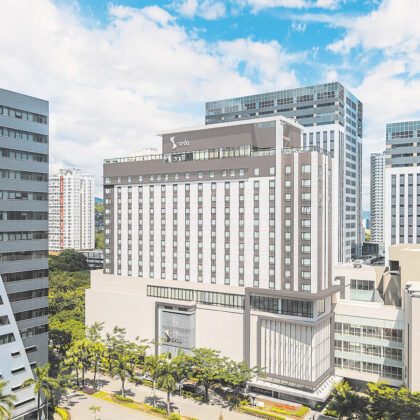IT MIGHT not make sense for sister hotels to be within a 15-minute drive of each other, but the two Seda Hotels in Cebu, by Ayala Land Hotels and Resorts, are making it work.
There are subtle differences. While all Seda hotels around the nation (from Quezon City to Cagayan de Oro) have a Misto all-day dining outlet and buffet, we noted that the Misto in Seda Central Bloc has a roasting station where you can see a whole lechon Cebu spin on a spit, the older Seda Ayala Center Cebu, does not have one (we were served lechon belly instead; no complaints here).
Furthermore, Seda Central Bloc, which opened just a month before the COVID-19 lockdowns of March 2020, has a hybrid format. There are 214 rooms, 108 of which are deluxe rooms measuring 28 sqm. One can choose a king-sized bed or two twin beds, and the room has a desk, a chaise longue, and a swivel chair. The rest of the hotel is devoted to serviced apartments: studio (30 sqm.), one bedroom (55-58 sqm.), two bedroom (63-67 sqm.), and a three-bedroom (there are only two, at 90 sqm.). These are meant for long-haulers, with a working kitchenette and a washer-dryer combination.
“We feel that there’s a demand (for serviced apartments) in terms of leisure, staycations, and the corporate market,” said Ron Manalang, General Manager of Seda Central Bloc Cebu, during a media trip to both Cebu Sedas on May 24 to 26.
Meanwhile, the older Seda, Ayala Center Cebu, opened in 2018, rebranding from the building’s previous occupant, the Cebu City Marriott Hotel. “The shift was very smooth,” noted Gwen Dela Cruz, Seda Ayala Center Cebu General Manager. The older Seda has 301 rooms, ranging in size from Deluxe Rooms (30-32 sqm.) to the Club and Seda Suites (66-88 sqm.), meaning it has a more conventional layout than its younger sibling property.
Both have access to nearby Ayala malls.
LOCATION, LOCATION, LOCATION
Still, just like every real estate pro will tell you, their differences lie in location, location, location.
The younger vibe of Seda Central Bloc Cebu can be credited to its newer inception (2020; though the Cebu I.T. Park where its located opened in 2000). “All the BPO companies are just surrounding us. This is what’s making it for us,” said Mr. Manalang. Meanwhile, Seda Ayala Center Cebu occupies a well-loved and familiar space at the Cebu Business Park.
“The two Sedas are not there to compete, but to uplift each other,” said Ms. Dela Cruz. “If you take a look at the businesses, here (at Seda Ayala Center), it’s really more of corporations,” she said, noting that the main Cebu offices of Ayala-controlled Bank of the Philippine Islands and Globe Telecom are located nearby. “While there, it’s BPOs.”
This means that the clientele of each hotel is different: the Seda Ayala Center Cebu has an older, more genteel clientele, thanks to its familiar location and the businesses around it; while Seda Central Bloc Cebu has younger customers (which might explain why the party was hopping at the younger property’s Straight Up bar, while we went straight to bed at the Seda Ayala Center Cebu; some of our colleagues though took advantage of the sauna and the spa services).
UNITED IN SUSTAINABILITY
What does unite them are their sustainability measures: Seda Central Bloc Cebu might be a bit ahead, having equipped its roofdeck with a 53 KWP (kilowatt peak) solar panel system, which, according to Mr. Manalang, has saved them P700,000 in power consumption costs. Its rooms are also equipped with dispenser-type toiletries (no more tiny bottles). However, Seda Ayala Center Cebu still has a few green tricks up its sleeve: it sources some of its food from local farmers and fisherfolk, and a reverse osmosis system helps them produce their own purified water (stored in glass, not plastic bottles; they do the same in Central Bloc).
“Seda Ayala Center Cebu was able to provide clean water to our neighbors and the environment,” said Ms. Dela Cruz, about what it faced, and what it was able to do, during Supertyphoon Rai (local name: Odette) in December 2021.
According to Ms. Dela Cruz, both properties hand over their plastics to GUUN Co., Ltd., a Japanese waste treatment business that converts plastics into “fluff fuel” (an alternative to solid fossil fuels like coal).
All Seda properties also allocate funds towards the care of Mayumi, a Philippine Eagle they adopted through the Philippine Eagle Foundation.
“It’s really helping from the heart,” said Ms. Dela Cruz about the importance of sustainability for their brand. “Every act we do, there has to be a repercussion: how we need to help the environment.”
The Seda Central Bloc Cebu is at Cebu’s I.T. Park, while Seda Ayala Cebu is at Cebu Business Park. See their amenities at https://www.sedahotels.com/location/hotels/cebu-city. — Joseph L. Garcia





